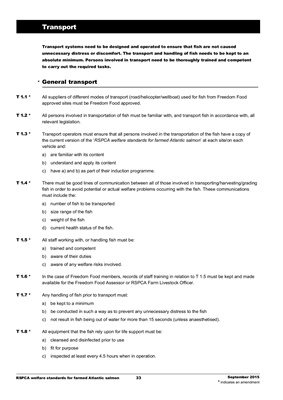
RSPCA welfare standards for farmed Atlantic salmon 33 September 2015
* indicates an amendment
Transport
Transport systems need to be designed and operated to ensure that fish are not caused
unnecessary distress or discomfort. The transport and handling of fish needs to be kept to an
absolute minimum. Persons involved in transport need to be thoroughly trained and competent
to carry out the required tasks.
* General transport
T 1.1 * All suppliers of different modes of transport (road/helicopter/wellboat) used for fish from Freedom Food
approved sites must be Freedom Food approved.
T 1.2 * All persons involved in transportation of fish must be familiar with, and transport fish in accordance with, all
relevant legislation.
T 1.3 * Transport operators must ensure that all persons involved in the transportation of the fish have a copy of
the current version of the 'RSPCA welfare standards for farmed Atlantic salmon' at each site/on each
vehicle and:
a) are familiar with its content
b) understand and apply its content
c) have a) and b) as part of their induction programme.
T 1.4 * There must be good lines of communication between all of those involved in transporting/harvesting/grading
fish in order to avoid potential or actual welfare problems occurring with the fish. These communications
must include the:
a) number of fish to be transported
b) size range of the fish
c) weight of the fish
d) current health status of the fish.
T 1.5 * All staff working with, or handling fish must be:
a) trained and competent
b) aware of their duties
c) aware of any welfare risks involved.
T 1.6 * In the case of Freedom Food members, records of staff training in relation to T 1.5 must be kept and made
available for the Freedom Food Assessor or RSPCA Farm Livestock Officer.
T 1.7 * Any handling of fish prior to transport must:
a) be kept to a minimum
b) be conducted in such a way as to prevent any unnecessary distress to the fish
c) not result in fish being out of water for more than 15 seconds (unless anaesthetised).
T 1.8 * All equipment that the fish rely upon for life support must be:
a) cleansed and disinfected prior to use
b) fit for purpose
c) inspected at least every 4.5 hours when in operation.